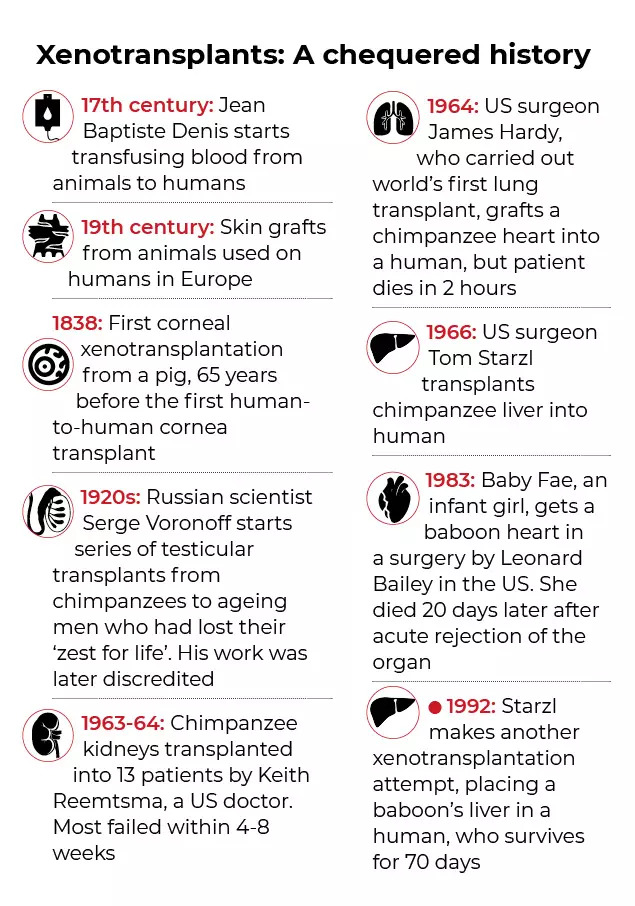Dr Dhani Ram Baruah
This is a collection of articles archived for the excellence of their content. Additional information may please be sent as messages to the Facebook community, Indpaedia.com. All information used will be gratefully acknowledged in your name.
This is a collection of articles archived for the excellence of their content. |
A brief biography
January 12, 2022: The Times of India

From: January 12, 2022: The Times of India
Termed a 'historic' feat, surgeons from the University of Maryland Medical School in the US successfully implanted a heart from a genetically modified pig in a 57-year-old man last week. The procedure could one day help solve the chronic shortage of organ donations. The patient, David Bennett, had been deemed ineligible for human transplant – a decision that is often taken when the recipient has very poor underlying health.
Way back in 1997, an Indian doctor had tried a similar procedure. Dr Dhani Ram Baruah had then transplanted a pig’s heart into a 32-year-old man, Purno Saikia, who had a ventricular septal defect, or hole in the heart. With Baruah was an equally controversial Hong Kong-based cardiac surgeon, Dr Jonathan Ho Kei-Shing. Ho had his own run-in with the Chinese government in 1992, when he fit heart valves made from ox tissue — designed by Baruah — into human patients.
Saikia’s surgery, according to Baruah, lasted 15 hours. He died of multiple infections a week later. The survival period determined by the International Society for Heart and Lung Transplantation for a xenotransplantation — the transplantation or infusion of any organ from one species to another — to be considered safe for human trial is 90 days.
The transplant procedure stirred a hornet’s nest in Assam. Both Baruah and Ho were arrested and charged under section 304 (culpable homicide not amounting to murder) of the Indian Penal Code (IPC) and section 18 of the Transplantation of Human Organs Act, 1994 (removal of human organ without authority). Besides, the Dr Dhaniram Heart Institute and Research Centre where the surgery was conducted was found to have “neither applied for nor obtained registration” as required under the transplant laws.
The government even alleged that the heart may not have been that of a pig — a claim that was later dismissed by Central Forensic Science Research Laboratory in Kolkata in June 1999. Baruah was released on bail after 40 days in jail.
Baruah, who is now 72 years old, lost his ability to speak normally following a stroke in 2016. His long-time associate Geeta said "One is however able to understand what he is saying. He told me that he is happy with the news (of the successful transplant on January 7, 2022) and remembers clearly the surgery he had performed on January 1, 1997."
When Baruah returned from jail a month after he performed the surgery, he found his clinic and lab gutted, his animal farm destroyed, and his water and power supply cut off. He spent the next 18 months under virtual house arrest. He then survived on rainwater and little food, and depended on the charity of friends and his wife, also a doctor in Glasgow.
When the controversy had erupted, Baruah was a heart surgeon of international standing. In the early-1980s, he was asked by then-Prime Minister Indira Gandhi and Assam chief minister Hiteshwar Saikia to set up an open heart surgery clinic in his home state. In 1989, he set up a facility in Mumbai to manufacture the patented Baruah heart valve, which has since been used on patients the world over.
After the controversy, public opinion and the media turned against him. Over nearly two years of being confined to the gutted campus, Baruah was subjected to taunts and abuse by residents of the area, who called him insane to his face. But the doctor carried on with his research.
In the years following the procedure, Baruah surfaced continually with claims considered bizarre or path-breaking — depending on which side of the debate one is on. In 2008, he claimed to have developed a “genetically engineered” vaccine that would “correct” congenital heart defects. In 2011, he claimed to have found the “cure” for HIV by “stopping the amplification of micro-RNA”. Four years later, he announced he had successfully isolated biological molecules from medicinal plants in the Himalayan region, the Baruah Biological Combat Genes, which he said would act as “biological missiles” to “kill HIV”.
The landmark Jan 7, 2022 surgery
The transplant patient, David Bennett, had spent the last several months bedridden on a heart-lung bypass machine.
Bennett's donor pig belonged to a herd that had undergone genetic editing procedures. The editing was performed by Virginia-based biotech firm Revivicor. The donated organ was kept in an organ-preservation machine ahead of the surgery, and the team also used an experimental new drug made by Kiniksa Pharmaceuticals along with conventional anti-rejection drugs to suppress the immune system.
Bartley Griffith, the doctor who surgically transplanted the pig heart, said: "This was a breakthrough surgery and brings us one step closer to solving the organ shortage crisis," The patient, Bennett, is stable following the surgery.